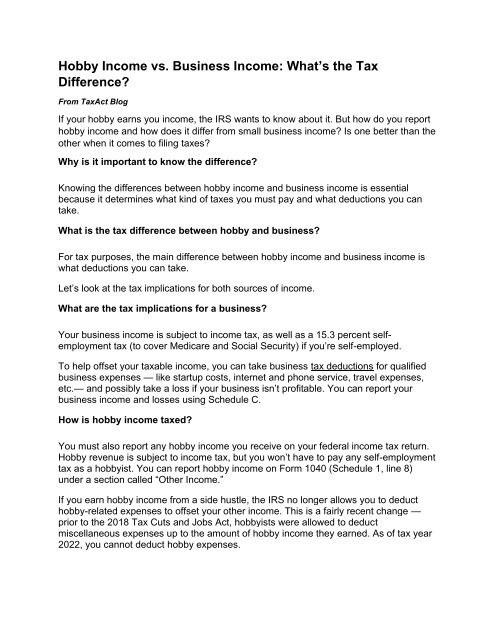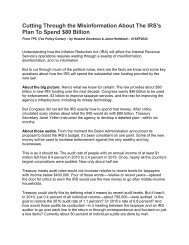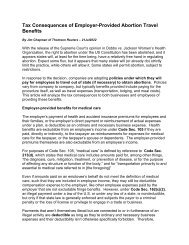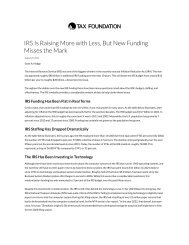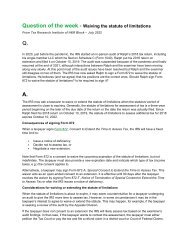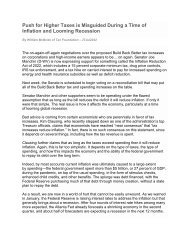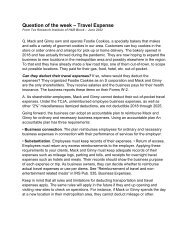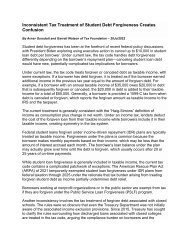Hobby Income vs Business Income
Create successful ePaper yourself
Turn your PDF publications into a flip-book with our unique Google optimized e-Paper software.
<strong>Hobby</strong> <strong>Income</strong> <strong>vs</strong>. <strong>Business</strong> <strong>Income</strong>: What’s the Tax<br />
Difference?<br />
From TaxAct Blog<br />
If your hobby earns you income, the IRS wants to know about it. But how do you report<br />
hobby income and how does it differ from small business income? Is one better than the<br />
other when it comes to filing taxes?<br />
Why is it important to know the difference?<br />
Knowing the differences between hobby income and business income is essential<br />
because it determines what kind of taxes you must pay and what deductions you can<br />
take.<br />
What is the tax difference between hobby and business?<br />
For tax purposes, the main difference between hobby income and business income is<br />
what deductions you can take.<br />
Let’s look at the tax implications for both sources of income.<br />
What are the tax implications for a business?<br />
Your business income is subject to income tax, as well as a 15.3 percent selfemployment<br />
tax (to cover Medicare and Social Security) if you’re self-employed.<br />
To help offset your taxable income, you can take business tax deductions for qualified<br />
business expenses — like startup costs, internet and phone service, travel expenses,<br />
etc.— and possibly take a loss if your business isn’t profitable. You can report your<br />
business income and losses using Schedule C.<br />
How is hobby income taxed?<br />
You must also report any hobby income you receive on your federal income tax return.<br />
<strong>Hobby</strong> revenue is subject to income tax, but you won’t have to pay any self-employment<br />
tax as a hobbyist. You can report hobby income on Form 1040 (Schedule 1, line 8)<br />
under a section called “Other <strong>Income</strong>.”<br />
If you earn hobby income from a side hustle, the IRS no longer allows you to deduct<br />
hobby-related expenses to offset your other income. This is a fairly recent change —<br />
prior to the 2018 Tax Cuts and Jobs Act, hobbyists were allowed to deduct<br />
miscellaneous expenses up to the amount of hobby income they earned. As of tax year<br />
2022, you cannot deduct hobby expenses.
<strong>Hobby</strong> loss rules apply to small businesses classified as sole proprietorships,<br />
partnerships, and S corps. These rules do not apply to corporations, which are their own<br />
business entity.<br />
When you use our tax prep software, TaxAct ® will help you appropriately report hobby<br />
income by asking simple interview questions and matching your income to the proper<br />
tax forms.<br />
At what point is my hobby considered a business?<br />
Now that you know the difference, how do you know if your hobby activity is really a<br />
business or vice versa? The IRS looks at several criteria when determining whether to<br />
classify your income as a hobby or a business.<br />
For your business to meet IRS guidelines, you should have made a profit in at least<br />
three of the last five consecutive years (there is a special exception to this rule if you<br />
breed, train, show, or race horses).<br />
But if you’re still scratching your head trying to figure out how to report your income,<br />
consider the following questions:<br />
• Do you run your activity in a businesslike manner while keeping complete and<br />
accurate business records?<br />
• Do you put time and effort into making your activity profitable?<br />
• Do you depend upon the income for your livelihood?<br />
• Do you have personal motives (enjoyment, relaxation, etc.) for doing this activity?<br />
• Do you have enough income from other sources to fund this activity?<br />
• Are losses from this activity beyond your control or normal during the startup<br />
phase?<br />
• Have you changed your methods of operation to try to improve your profits?<br />
• Do you (or an advisor) have the knowledge and expertise necessary to make this<br />
activity a successful business?<br />
• Have you successfully made a profit from similar activities before?<br />
• Is your activity profitable during some years, and if so, how much?<br />
• Do you expect to make a profit in the future?<br />
The IRS considers these factors on a case-by-case basis when auditing taxpayers.<br />
Typically, it all boils down to whether you intend to make a profit or whether you are<br />
doing something just for fun with no real intent to make a profit.<br />
The IRS has classified my business as a hobby. What should I do?<br />
When you are used to claiming business deductions on your tax return, it can be<br />
confusing and frustrating if the IRS suddenly says your business looks more like a<br />
hobby. This could happen if your business claims a net loss for too many years in a row<br />
or fails to meet other business criteria in the eyes of the IRS.
If you have a legitimate business, it’s important to keep thorough and accurate business<br />
records and save your receipts. Detailed bookkeeping of your business transactions<br />
and a written business plan can help you demonstrate a valid profit motive to the IRS if<br />
they decide to challenge your business classification.<br />
This article is for informational purposes only and not legal or financial advice.


